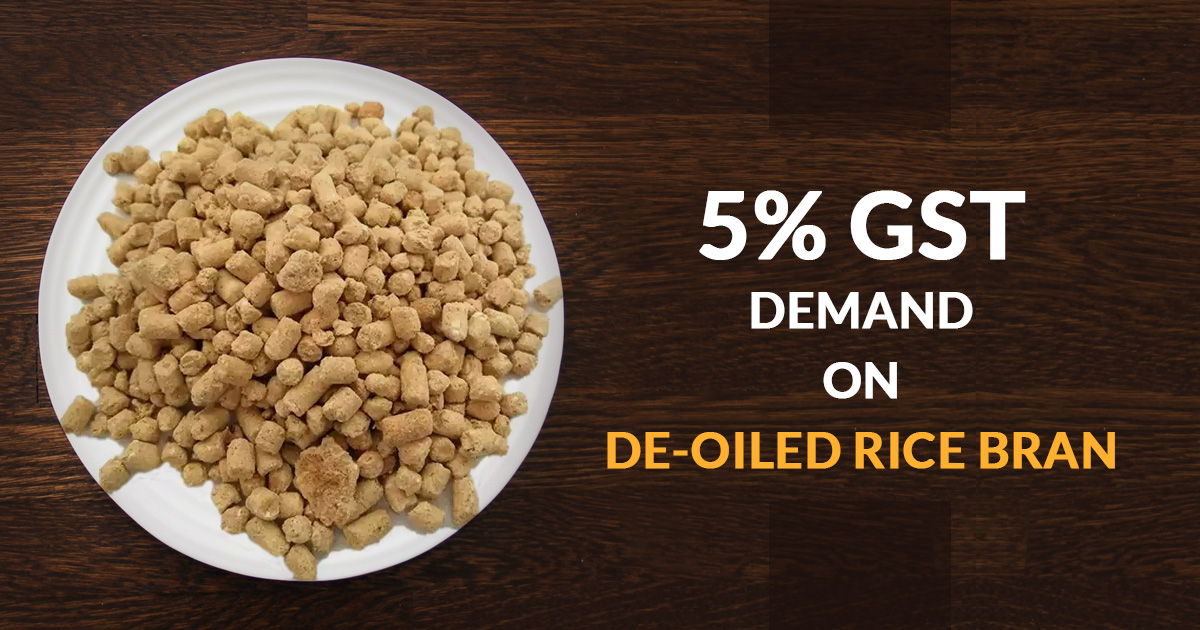At present time, GST at 5% applicable on Rice bran (before oil extraction) and crude rice bran oil but de-oiled rice bran oil are out of the GST radar. However, now the Department of Food and Public Distribution is suggesting North Block to levy GST at 5% on de-oiled rice bran (DORB).

As per a source “Department of food and public distribution secretary – Sudhanshu Pandey in a letter to revenue secretary Ajay Bhushan Pandey has called for an urgent imposition of 5 percent GST on de-oiled rice bran.”
The Food Department believes that the country needs to increase domestic production of rice bran oil which is now only 60 percent of its capacity. This step will also help in the Atma Nirbhar Bharat initiative.
A letter from the department of food and public distribution secretary states that “Department is striving to increase domestic production of edible oils and thereby reduce our dependence on imports which is 60 percent of the total consumption. ln order to increase domestic production of edible oils, it was felt that ways of increasing the domestic production of rice bran oil in the country, which is now only 60 percent of its potential, be explored. Taking this forward, the committee of secretaries (CoS) in its meeting held on January 28, 2021, recommended that the production of rice bran oil may be increased in the country for domestic use and the same may be promoted extensively as a healthy medium of cooking”.
The same source also said that “once the levy is introduced it will dis-incentivize the sale of rice bran directly to feed manufacturers as de-oiled rice bran, thereby increasing the availability of rice bran for oil extraction.”
Further, he added that the Food Ministry also believes that this step will prevent the loss to the government exchequer because unscrupulous traders are selling rice bran as D-oil rice bran.
Currently, GST at 5% applicable on Rice bran (before oil extraction) and crude rice bran oil but de-oiled rice bran doesn’t have any GST levied. Thus it is also expected that this matter will be taken up by a committee of ministers headed by the Home Minister, and they will go through the price status and availability of essential food items and edible oil in our country.
Source also said that the rationale expressed by the ministry is that “currently Rice bran is sold directly to animal feed producers directly from the un-organized market or billed as de-oiled rice bran, so as to avail nil GST. Rice bran and de-oiled rice bran are similar in appearance and cannot be differentiated. This results in less availability of rice bran for oil extraction. 5 percent GST may be imposed on de-oiled rice bran so as to level the playing field and dis-incentivize the sale of rice bran directly to feed manufacturers as de-oiled rice bran, thereby increasing the availability of rice bran for oil extraction. lt will also prevent loss to the exchequer on account of the sale of rice bran as de-oiled rice bran by unscrupulous traders. It will also be beneficial to the oil extraction units in the form of input GST offset on rice bran oil.”
Meanwhile, the important fact is that the Finance Ministry doesn’t take any decision on GST whether to reduce or increase tax, it comes under the GST Council, which is the governing body of GST and consists of finance ministers of states and centre.
When it is related to rates, then the procedure laid down by the Council rules that the GST Council Designated Nomination Committee studies all the proposals brought forward by various stakeholders. Then a mix of centre and state officials comes under the Fitment committee, assessees rationale, industry response, impact, and various other factors before making recommendations to the council. However, the Council has the right to accept or reject the recommendation.
Pratik Jain, who leads the indirect tax practice at PwC India expressed that “From a policy standpoint, removal of any GST exemption results in the free flow of input credit and hence makes sense. However, since DORB is an important cattle feed, the move may be resisted by some States,”
We have to wait for the final decision by the GST Council, It will look into the matter definitely but when the economy is still in recovery mode, It is also possible that the Council may not tinker with any rates for now.








